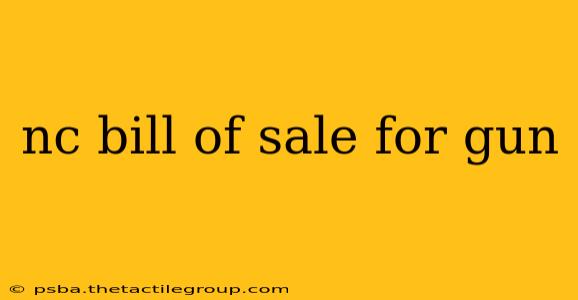Selling or buying a firearm in North Carolina requires careful adherence to state and federal laws. A crucial part of this process is the proper documentation, specifically a Bill of Sale. This guide will walk you through everything you need to know about creating and using a North Carolina Bill of Sale for firearms, ensuring a smooth and legal transaction.
What is a North Carolina Bill of Sale for a Firearm?
A North Carolina Bill of Sale for a firearm is a legally binding document that records the transfer of ownership of a firearm from the seller to the buyer. It serves as proof of the sale and protects both parties involved. While not strictly required by North Carolina law for all firearm transactions, it's strongly recommended as it provides crucial evidence in case of disputes or legal issues.
Key Information to Include in Your NC Firearm Bill of Sale
A comprehensive Bill of Sale should include the following information:
- Date of Sale: The exact date the firearm is transferred.
- Seller Information: Full legal name, address, phone number, and driver's license or other government-issued identification number.
- Buyer Information: Full legal name, address, phone number, and driver's license or other government-issued identification number.
- Firearm Description: This is crucial and needs to be incredibly detailed. Include the following:
- Make: (e.g., Smith & Wesson, Glock, Ruger)
- Model: (e.g., M&P 9, Glock 19, 10/22)
- Serial Number: This is arguably the most important piece of information. Double-check its accuracy.
- Caliber: (e.g., 9mm, .22LR, .45 ACP)
- Condition: (e.g., Excellent, Good, Fair, Poor) – Be as descriptive as possible.
- Purchase Price: The agreed-upon sale price in US dollars.
- Method of Payment: Specify how the payment was made (e.g., cash, check, money order).
- Signatures: Both the seller and the buyer must sign and date the document. A witness signature is also recommended, adding an extra layer of verification.
Understanding North Carolina's Firearm Laws
Before proceeding with any firearm sale, both the buyer and seller should familiarize themselves with North Carolina's specific regulations regarding firearms. These laws cover aspects such as:
- Background Checks: Federal law requires licensed firearms dealers to conduct background checks through the National Instant Criminal Background Check System (NICS). Private sales may have different requirements depending on the type of firearm and the relationship between the buyer and seller. It's always best to err on the side of caution and research current laws thoroughly.
- Waiting Periods: North Carolina may have waiting periods depending on the type of firearm and the buyer's background.
- Prohibited Persons: Certain individuals are legally prohibited from owning firearms. Both parties need to be aware of these restrictions.
Disclaimer: This information is for educational purposes only and does not constitute legal advice. Always consult with legal professionals for guidance on specific legal matters regarding firearms transactions in North Carolina.
Sample Bill of Sale
While a specific template isn't mandated, using a clear and comprehensive format like the one described above is vital. Numerous templates are available online; however, ensure the template includes all the information listed above for maximum legal protection.
Remember, a meticulously completed Bill of Sale is a critical component of a legal and secure firearm transaction in North Carolina. Prioritizing accuracy and detail protects both the seller and the buyer.

